2022 Market Agenda: Digital Business Enables Organizational Resilience
Ventana Research has announced its market agenda for 2022, continuing the tradition of reliability in our efforts to educate and guide the technology market. Our assessments are backed by our expertise and independence, as we do not share our market agenda or our research – including analyst and market perspectives or our Value Index – with any external party until it is published. We review and refine our market agenda throughout the year to ensure we offer the expertise and insights organizations rely on to better assess and navigate the direction of the technology industry.
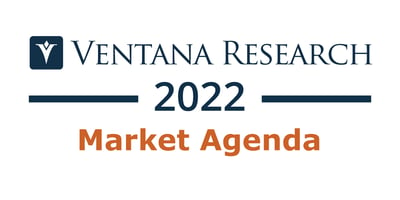 This year’s agenda advances the need to improve organizational resilience and workforce readiness through existing and new technology investments that strengthen business continuity and performance through digital effectiveness. We’ve expanded our focus to include new and refined research topics designed to enhance our traditional portfolio of expertise, available to everyone in our Ventana Research community.
This year’s agenda advances the need to improve organizational resilience and workforce readiness through existing and new technology investments that strengthen business continuity and performance through digital effectiveness. We’ve expanded our focus to include new and refined research topics designed to enhance our traditional portfolio of expertise, available to everyone in our Ventana Research community.
We’re advancing digital business, providing a blueprint for organizations to assess and prioritize investments of resources and time. Business continuity, experience management, governance and risk, performance management and sustainability management need to set the tone for successful integration of applications and technology. In addition, the focus on digital communications, digital payments, digital security and work management defines how the workforce should be equipped for a modern and more engaging experience. Lastly is digital transformation, an evolution we’ve witnessed over the past two decades. Organizations need to further refine the integration of digital business and technology to ensure the readiness and responsiveness capable of sustaining any “black swan” event that could disrupt normal operating conditions.
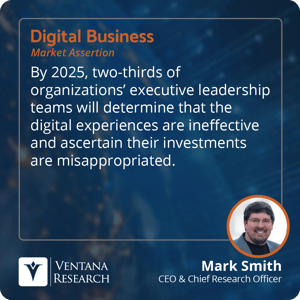 Typically, executives focus on incremental improvement rather than substantive changes needed for effective digitalization of the organization and business processes. They lack sufficient time and resources to adapt digital transformation and enable the continuity and resilience required, leaving the organization unprepared for major disruptions such as we experienced during 2020. Our market assertion is that by 2025, two-thirds of organizations’ executive leadership teams will determine that the digital experiences used by their workforce are unacceptable and ascertain their investments are misappropriated. This can lead to the growth of dedicated leadership positions such as chief digital officer and chief innovation officer, working with their chief information officer and operational leadership peers to drive organizational agility and readiness.
Typically, executives focus on incremental improvement rather than substantive changes needed for effective digitalization of the organization and business processes. They lack sufficient time and resources to adapt digital transformation and enable the continuity and resilience required, leaving the organization unprepared for major disruptions such as we experienced during 2020. Our market assertion is that by 2025, two-thirds of organizations’ executive leadership teams will determine that the digital experiences used by their workforce are unacceptable and ascertain their investments are misappropriated. This can lead to the growth of dedicated leadership positions such as chief digital officer and chief innovation officer, working with their chief information officer and operational leadership peers to drive organizational agility and readiness.
In addition to these new areas of focus, we’ve made substantive advancements in each business and technology expertise and focus area. Here’s a snapshot of the topics our subject matter experts will explore this year.
Analytics: Responding to the necessity for effective analytics and the nature of operating in real-time, our Analytics expertise area — led by senior vice president and research director David Menninger — helps organizations advance business potential. David’s market assertion is that by 2024, one-third of organizations will adopt natural language processing as a component of improving digital experiences for business professionals who desire conversational methods by reading and talking. Wide adoption is gained by first implementing natural language processing to enable the range of interactions with analytics. But operating the organization in real-time requires streaming analytics as data and events flow across networks, and process mining to ensure insights are aligned to the nature of this technology. Traditional use of analytics in business intelligence is still critical, and embedded analytics can help ensure availability where the workforce operates. Most relevant is the application of artificial intelligence and machine learning to assist in the use of analytics in a more intelligent manner, delivering more impactful insights. David’s analyst perspectives provide more detail on our exploration of analytics technologies.
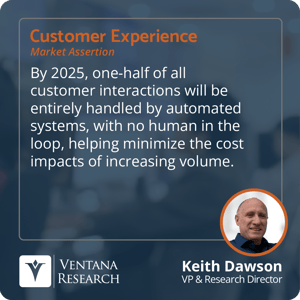 Customer Experience: Experiences are a necessity to the engagement and relationship with customers, and our vice president and research director, Keith Dawson, asserts that by 2025, one-half of all customer interactions will be handled entirely by automated systems, with no human in the loop, helping minimize the cost impacts of increasing volume. To support this transition, we have augmented our Customer Experience focus to include Agent Management, Customer Experience Management, Field Service, Contact Center and Voice of the Customer, along with Customer Service and Support. Under pressure from customer expectations, organizations are forced to invest and improve processes, in many cases prioritizing systems that support agents as well as new digital engagement with machine-based virtual agents. As experiences with customers grow in importance, a new generation of platforms and applications are creating a unified approach to support interactions across the customer journey. And field service, traditionally handled within a business unit, is becoming a focal point of effective operations and the overall customer journey.
Customer Experience: Experiences are a necessity to the engagement and relationship with customers, and our vice president and research director, Keith Dawson, asserts that by 2025, one-half of all customer interactions will be handled entirely by automated systems, with no human in the loop, helping minimize the cost impacts of increasing volume. To support this transition, we have augmented our Customer Experience focus to include Agent Management, Customer Experience Management, Field Service, Contact Center and Voice of the Customer, along with Customer Service and Support. Under pressure from customer expectations, organizations are forced to invest and improve processes, in many cases prioritizing systems that support agents as well as new digital engagement with machine-based virtual agents. As experiences with customers grow in importance, a new generation of platforms and applications are creating a unified approach to support interactions across the customer journey. And field service, traditionally handled within a business unit, is becoming a focal point of effective operations and the overall customer journey.
Data: Our Data expertise, led by vice president and research director Matt Aslett, is establishing a focus on the effective impact of data across any requirement of the organization. The fundamentals of Data Management ensure outcomes from processes are optimized through the application of analytics and insights. This effort is facilitated through the use of Data Operations that ensure the science and engineering of data for any purpose. Data Operations is also intertwined with Data Governance to ensure accurate utilization of data. Establishing this commitment requires technology used for Analytic Data Platforms or Operational Data Platforms, and operating in a hybrid computing environment. As Matt asserts, through 2026 — and despite increased demand for hybrid operational and analytic processing — more than three-quarters of data platform use cases will have functional requirements that encourage the use of specialized analytic or operational data platforms. In addition, operating as data flows across the organization requires that Streaming Data and Events technology is architected to meet business requirements. Follow Matt’s analyst perspectives to monitor the evolution of data technology.
Human Capital Management: In the expertise of Human Capital Management, we are continuing our dedicated work and market research in the focus areas of Employee Experience, Learning Management, Payroll Management, Total Compensation Management and Workforce Management as well as the optimal use of Talent Management. This year will be a significant year in managing expectations of the organization and the worker. We assert that by 2024, one-third of corporate human resource functions will formalize their “hybrid workplace” operating practices via company-facing advisory and consultative services designed to allow business areas and teams to thrive. Addressing the needs of the individual and their career requires a focus on skill development that can support the advancement of worker potential. Meeting the demand for talent growth ─ from recruiting and hiring to onboarding ─ will require more effective candidate engagement to ensure organizational growth. But once in an organization, worker career development requires continued investment in coaching, mentoring and performance management. For organizations to navigate the path of HCM requires the use of people analytics and workforce planning to help decision-makers and managers and support diversity, equity and inclusion improvement. Key to the success of these initiatives will be an effective set of technological requirements and a structured vendor evaluation process to ensure the human capital management platform and applications meet future requirements of the organization. I am leading this expertise area as we establish a new leader for our HCM efforts. Steve Goldberg is transitioning to an industry consultant, but you can still read his analyst perspectives on the HCM technology landscape.
Marketing: There has never been a more challenging time for marketers, who need to be digitally effective at every interaction to gain engagement across every process. Vice president and research director Keith Dawson and I continue to lead the effort to advance the effectiveness of marketing organizations. Our Marketing expertise covers fundamental and advanced techniques in Conversational Marketing; Digital Marketing; Intelligent Marketing, designed for optimal engagement; and Product Information Management, focused on product experiences. We are advancing our work in Digital Experience Platforms, which ensure information and interactions are modernized across processes and systems. Keith asserts that by 2025, one-third of marketing organizations will rationalize technology portfolios towards a unified digital experience platform to streamline operations. Advancing the management of marketing is not easy with the processes and volume of data available, which is why the use of Marketing Performance Management can help with planning analytics that align the resources and budgets to reach the desired objectives.
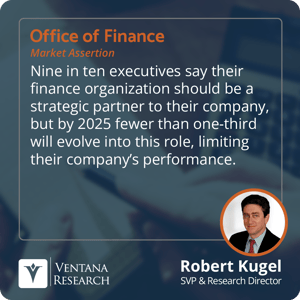 Office of Finance: Improving the resilience of finance processes can help organizations achieve desired outcomes and ensure readiness to respond to market changes. My colleague, Robert Kugel, senior vice president and research director in the Office of Finance expertise area, asserts that 9 in ten executives say their finance organization should be a strategic partner to their company, but by 2025 fewer than one-third will evolve into this role, limiting their company’s performance. Our well-established Office of Finance expertise in Business Planning, Enterprise Resource Planning, Continuous Accounting and Financial Performance Management ─ as well as our work in Revenue, Lease and Tax Accounting ─ provide key insights for finance leaders. Continued coverage for 2022 includes Profitability Management and Digital Finance, with an emphasis on the science of using analytics and modeling to guide profitability. We have established intercompany financial management as a discipline for digitizing accounting and reconciliation processes that intersect costs and activities across the organization and workforce.
Office of Finance: Improving the resilience of finance processes can help organizations achieve desired outcomes and ensure readiness to respond to market changes. My colleague, Robert Kugel, senior vice president and research director in the Office of Finance expertise area, asserts that 9 in ten executives say their finance organization should be a strategic partner to their company, but by 2025 fewer than one-third will evolve into this role, limiting their company’s performance. Our well-established Office of Finance expertise in Business Planning, Enterprise Resource Planning, Continuous Accounting and Financial Performance Management ─ as well as our work in Revenue, Lease and Tax Accounting ─ provide key insights for finance leaders. Continued coverage for 2022 includes Profitability Management and Digital Finance, with an emphasis on the science of using analytics and modeling to guide profitability. We have established intercompany financial management as a discipline for digitizing accounting and reconciliation processes that intersect costs and activities across the organization and workforce.
Operations and Supply Chain: Our Operations and Supply Chain expertise will expand in 2022 to further advance insights into digitization every organization can employ to increase resilience to meet the demand for products and services. This must be established through a Continuous Supply Chain that operates with Enterprise Resource Planning, supported through Continuous Planning to work towards mutual outcomes. At the core of the supply chain is the interconnected aspects of product life cycle management that contribute to Product Information Management for sharing across the enterprise and customers, partners and suppliers. Through 2024, supply/demand chain management in over one-half of organizations will remain inadequate to ensure resilience and business continuity, requiring aggressive digital innovation. A continued investment into Supplier Relationship Management addresses what has placed undue pressure on sourcing, fulfillment, invoice reconciliation and payment terms activities. There is also a need to optimize use of assets with Property Technology, targeting substantial opportunities to improve the tenant, landlord and owner relationship.
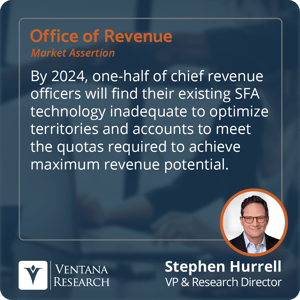 Office of Revenue: My colleague, Stephen Hurrell, vice president and research director in the Office of Revenue expertise area, examines processes and technology for Revenue Management that support all channels and departments for buying and selling products and services. Stephen asserts by 2024, one-half of chief revenue officers will find their existing sales force automation technology inadequate to optimize territories and accounts to meet the quotas required to achieve maximum revenue potential. Managing the performance across channels and departments that support buyer and seller interactions requires Revenue Performance Management systems. The growth in consumer interactions for goods and services has led to transformation of Digital Commerce technology and platforms to support web and mobile interactions. In many cases, the recurring aspects of digital services has also led to dedicated Subscription Management technology that can manage the experiences of subscribers and subscriptions. Supporting the selling experience requires organizations to invest in Sales Engagement applications to ensure optimal interactions throughout the buyers’ journey. The impact of the revenue potential and resulting customer experience from third-party channels requires Partner Management software to support the indirect channel of revenue and ensure optimal operations and desired outcomes.
Office of Revenue: My colleague, Stephen Hurrell, vice president and research director in the Office of Revenue expertise area, examines processes and technology for Revenue Management that support all channels and departments for buying and selling products and services. Stephen asserts by 2024, one-half of chief revenue officers will find their existing sales force automation technology inadequate to optimize territories and accounts to meet the quotas required to achieve maximum revenue potential. Managing the performance across channels and departments that support buyer and seller interactions requires Revenue Performance Management systems. The growth in consumer interactions for goods and services has led to transformation of Digital Commerce technology and platforms to support web and mobile interactions. In many cases, the recurring aspects of digital services has also led to dedicated Subscription Management technology that can manage the experiences of subscribers and subscriptions. Supporting the selling experience requires organizations to invest in Sales Engagement applications to ensure optimal interactions throughout the buyers’ journey. The impact of the revenue potential and resulting customer experience from third-party channels requires Partner Management software to support the indirect channel of revenue and ensure optimal operations and desired outcomes.
Our work in 2021 found that organizations remain in transformation to optimize resilience and workforce readiness across all business processes to survive any “black swan” event, like the continuing pandemic. Our belief is that digital business requires technology and innovation necessary to ensure productivity and experiences are working together to deliver on the strategic objectives for every business.
At Ventana Research, we guide organizations to digital effectiveness through our subject matter expertise, market research and industry experience with technology to achieve desired outcomes from current and future investments. Enjoy our market agenda for 2022 and the in-depth perspectives that facilitate the knowledge to utilize technology in the most effective manner. Subscribe to our Ventana Research community at no cost and stay up to date on our 2022 research efforts. Check out our market expertise and focus areas, and access educational resources available exclusively to members.
Regards,
Mark Smith

Mark Smith
Partner, Head of Software Research
Mark Smith is the Partner, Head of Software Research at ISG, leading the global market agenda as a subject matter expert in digital business and enterprise software. Mark is a digital technology enthusiast using market research and insights to educate and inspire enterprises, software and service providers.









